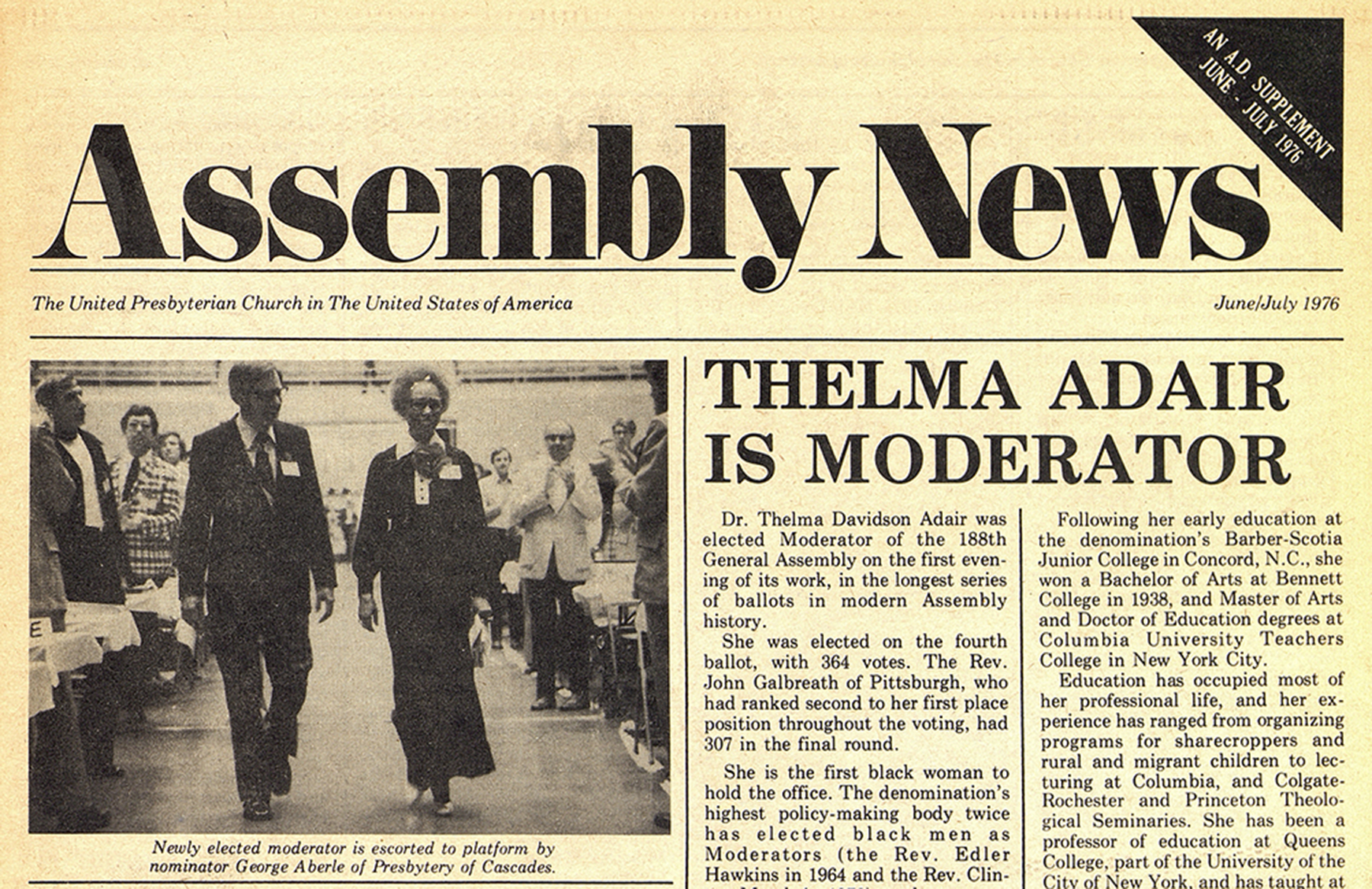![Left: Margaret Towner, 1956. [Pearl: 83470]. Right: Bronwen Boswell, undated. Photo via Presbyterian News Service.](/site_media/media/uploads/oga/images/bronwenboswell_margarettowner_1800w.jpg)
Left: Margaret Towner, 1956. [Pearl: 83470]. Right: Bronwen Boswell, undated. Photo via Presbyterian News Service.
![Left: Margaret Towner, 1956. [Pearl: 83470]. Right: Bronwen Boswell, undated. Photo via Presbyterian News Service.](/site_media/media/uploads/oga/images/bronwenboswell_margarettowner_1800w.jpg)
Left: Margaret Towner, 1956. [Pearl: 83470]. Right: Bronwen Boswell, undated. Photo via Presbyterian News Service.
In July, the Rev. Bronwen Boswell was appointed Acting Stated Clerk of the General Assembly of the Presbyterian Church (U.S.A.), following the retirement of the Rev. Dr. J. Herbert Nelson, II. In receiving that call, Boswell became the first woman Stated Clerk of the denomination.
When asked by the news service about her new role, Boswell said, “I am humbled and excited by this opportunity to serve the denomination in this way. It truly is a call, by COGA [Committee on the Office of the General Assembly] and the Holy Spirit.” Like many Presbyterian women before her, she has risen to a position of leadership within the faith though resilience, passion and the grace of God.
The naming of Boswell as Stated Clerk echoes other firsts, and other women leaders, in Presbyterian history — Louisa Woosley, Margaret Towner, Rachel Henderlite, Katie G. Cannon and Thelma Adair being a few who come to mind.
The Rev. Louisa Woosley became the first woman minister of record from an American Presbyterian denomination when she was ordained in 1889 by her home church in Kentucky, a member of the Cumberland Presbyterian Church (CPC). Despite having the full confidence of her congregation, Woosley’s ordination was not fully recognized by the CPC General Assembly. This detail did not halt Woosley — rather, she continued to speak from the pulpit for many years.
In 1930, Tillie Paul Tamaree was the first Native American woman elected as a ruling elder in the Presbyterian Church in the U.S.A. Before her election, Tillie Paul worked as a translator, civil rights advocate and missionary educator within the Tlingit community in the Pacific Northwest. In becoming a ruling elder she paved the way for future generations of proud Native American women leaders such as Elona Street-Stewart, the first Native American to serve as a synod executive and co-moderator of the General Assembly.
The Rev. Margaret Towner made history and headlines in 1956, over 60 years after Woosley was welcomed to the pulpit, becoming the first woman ordained in the Presbyterian Church in the U.S.A. (PCUSA). In a 1978 interview, she reflected on her experiences as a minister, saying that “There's still people who are offended by [ordained women] because they go back literally to First Corinthians and, you know, women should not speak in church, et cetera. I think that is getting less and less.”
![Rachel Henderlite leading an ecumenical service, 1976. [Pearl: 139389].](/site_media/media/uploads/oga/images/rg504_b13_f11_04_1800w.jpg)
Rachel Henderlite leading an ecumenical service, 1976. [Pearl: 139389].
The Rev. Dr. Rachel Henderlite paralleled Towner’s journey, becoming the first woman ordained in the Presbyterian Church in the United States in 1965. Despite such progress, many Presbyterians refused to support women leaders. Henderlite received an annual letter from a retired pastor in South Carolina with a message about the ordination of women: “[It] is a grievous sin because it says in the Bible, ‘Let the women keep silent in the churches.’” Henderlite would not be silenced and continued to heed the call of the Holy Spirit.
When the Rev. Dr. Katie Geneva Cannon was ordained by Catawba Presbytery in 1974, she became the first Black woman minister in the United Presbyterian Church in the U.S.A. (UPCUSA). A founding voice in Womanist theology, Cannon not only served behind the pulpit but spoke at the front of classrooms, teaching for years at Temple University and Union Presbyterian Seminary. In 2018, she founded the Center for Womanist Ethics at Union in Richmond; she died in August the same year. Her memory lives on through the many lives she influenced and touched.
Being the first requires grit and determination. Dr. Thelma Adair made headlines two years after Cannon, in 1976, when she was elected moderator of the 188th General Assembly of the UPCUSA, the first Black woman in that role. (Lois Stair had become the first white woman moderator of the General Assembly four years earlier, in 1972.) As moderator from 1976 to 1977, Adair traveled the world, visiting seventy countries and conducting meetings with local and national leaders including President Gerald Ford.

"Assembly News" front page, June-July 1976. From PHS collections.
In June 1975, the Rev. Blanca Estrella Otaño-Rivera — also known as Blanqui Otaño — became the first Hispanic clergywoman ordained in the UPCUSA. She earned a bachelor’s degree from the University of Puerto Rico and a divinity degree from the Latin American Biblical Seminary in Costa Rica. Immediately after graduation, Otaño received an invitation from her Presbyterian church in Caparra Terrace to serve as a local “missionary.” After that call, Blanqui served the church in various other roles, including her time on staff in the Women’s Program in the UPCUSA Program Agency.
The names above are only a few of a much larger number. As we celebrate Boswell’s leadership as Acting Stated Clerk, let us simultaneously look back and feel gratitude toward the many Presbyterian women who paved the way forward.
This article first appeared on the PHS blog.
